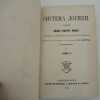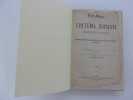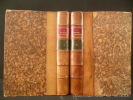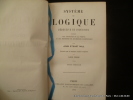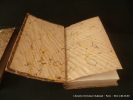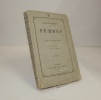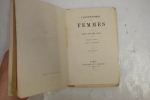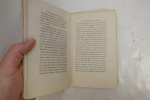76 books for « john stuart mill »Edit
-
Language
English (2)
French (72)
Russian (2)
-
Century
19th (20)
20th (24)
21st (6)
-
Countries
Belgium (9)
Denmark (6)
France (48)
Italy (1)
Switzerland (10)
United States of America (2)
-
Syndicate
CLAM (2)
ILAB (48)
NVVA (8)
SLACES (8)
SLAM (31)
John Stuart Mill, T. Dwight, J. McCarthy,R.H. Stoddard,P. Van Dyke,A. Ellerly Bergh
Reference : 015309
(1901)
Principles of Political Economy, Revised Edition, Volume I
New York - London 1901 The Colonial Press Cloth
Principles of Political Economy, Revised Edition, Volume I by John Stuart Mill with special introduction by Arthur T.Hadley The World's Great Classics, University Collection, limited to One Thousand Sets of which this is number 230 Editorial light green cloth, hard cover, upperside bookblock gilded, two other sides untrimmed, 24 x 16 cm, VII and 460 pages, 4 page wide illustrations, some wear on the covers, very clean inside in excellent condition
John Stuart Mill, T. Dwight, J. McCarthy,R.H. Stoddard,P. Van Dyke,A. Ellerly Bergh
Reference : 015310
(1901)
Principles of Political Economy, Revised Edition, Volume II
New York - London 1901 The Colonial Press Cloth
Principles of Political Economy, Revised Edition, Volume II by John Stuart Mill with special introduction by Arthur T.Hadley The World's Great Classics, University Collection, limited to One Thousand Sets of which this is number 230 Editorial light green cloth, hard cover, upperside bookblock gilded, two other sides untrimmed, 24 x 16 cm, X and 477 pages, 3 page wide illustrations, some wear on the covers, very clean inside in excellent condition
AUTOBIOGRAPHY OF JOHN STUART MILL
THE NEW AMERICAN LIBRARY. 1964. In-12. Broché. Bon état, 1er plat abîmé, Dos satisfaisant, Intérieur frais. 224 pages. Ouvrage en américain.. . . . Classification Dewey : 420-Langue anglaise. Anglo-saxon
With a foreword by ASA BRIGGS. Classification Dewey : 420-Langue anglaise. Anglo-saxon
System of logic In Russian/Sistema logiki
Short description: In Russian. Short description: Mill, John Stewart. System of Logic. St. Petersburg: 1867, M. O. Wolf The image is provided for reference only. It may reflect condition of one of the available copies or only help in identifying the edition. Please feel free to contact us for a detailed description of the copies available. SKU5220750
Sillogistic and inductive logic system In Russian/Sistema logiki sillogistichesk
Short description: Sillogistic and inductive logic system In Russian/Sistema logiki sillogisticheskoy i induktivnoy. In Russian. Short description: Mill, John Stewart. The system of logic is syllogistic and inductive. Moscow: 1900, magician. The image is provided for reference only. It may reflect condition of one of the available copies or only help in identifying the edition. Please feel free to contact us for a detailed description of the copies available. SKU5240311
John Stuart Mill. Trad. sur la 6 éd. anglaise par Louis Peisse
Reference : 4126
(1866)
Système de logique déductive et inductive. Exposé des principes de la preuve et des méthodes de recherche scientifique. EO en français. Traduit sur la sixième édition anglaise par Louis Peisse.
Paris, Librairie Philosophique de Ladrange, 1866, in-8, demi-reliure havane, pièce de titre et tomaison, Le plat 1 du tome 2 a souffert de l'humidité mais le texte et le reste de la reliure sont propres. Edition originale en français.
Système de logique déductive et inductive. Exposé des principes de la preuve et des méthodes de recherche scientifique. Traduit sur la sixième édition anglaise par Louis Peisse. TOME 1 SEUL.
Paris, Librairie Philosophique de Ladrange, 1866, in-8, demi-chagrin. , 545p. Edition originale de la traduction française. Reliure frottée au dos.
L'assujettissement des femmes. Deuxième édition
1876, Guillaumin et Cie, Paris. Rare. In-12, broché, 248pp. Dos fatigué à reprendre. Quelques rousseurs. Quelques pages décousues. Exemplaire fatigué
ON LIBERTY / PEOPLE'S EDITION.
HACHETTE. 1880. In-12. Cartonné. Bon état, Couv. légèrement pliée, Dos satisfaisant, Intérieur acceptable. 68 pages.. . . . Classification Dewey : 420-Langue anglaise. Anglo-saxon
Classification Dewey : 420-Langue anglaise. Anglo-saxon
Le gouvernement représentatif. Traduit et précédé d'une introduction par M. Dupont-White.
2ème édition. Guillaumin & Cie, Libraires, 1865. Format : 18/12. Pages : 400. Reliure demi-chagrin bon état, intérieur piqué
L'utilitarisme - Traduction nouvelle avec une introduction et des notes par Georges Tanesse
Edouard Privat Editeur Malicorne sur Sarthe, 72, Pays de la Loire, France 1964 Book condition, Etat : Bon broché, sous couverture imprimée éditeur blanche, grise et carmin, illustrée d'un portrait photographique en noir et blanc de John Stuart Mill grand In-8 1 vol. - 237 pages
1ere édition de cette traduction nouvelle, 1964 Contents, Chapitres : 1. Présentation de Georges Tanesse : Notice sur la vie et la philosophie de John Stuart Mill (Sa vie et ses écrits - Sa philosophie, sa philosophie théorique, sa philosophie pratique, sa philosophie de la religion - Vue d'ensemble sur la philosophie de J.S. MIll - Bibliographie - Notice sur l'Utilitarisme - Note sur le texte et sa traduction (88 pages de présentation) - 2. L'Utilitarisme : Considérations générales - Ce que c'est que l'utilitarisme - De la sanction dernière du principe de l'utilité - De quel genre de preuve le principe de l'utilité est susceptible - Du lien qui unit la justice et l'utilité - Notes et commentaires - Appendice : H. Spencer et J.S. MIll - Index - John Stuart Mill (20 mai 1806 à Londres - 8 mai 1873 à Avignon, France) est un philosophe, logicien et économiste britannique. Il fut l'un des penseurs libéraux les plus influents du XIXe siècle. Il était un partisan de l'utilitarisme, une théorie éthique préalablement exposée par son parrain Jeremy Bentham, dont Mill proposa sa version personnelle. En économie, il est l'un des derniers représentants de l'école classique. Féministe précurseur, Mill proposa en outre un système de logique qui opère la transition entre l'empirisme du XVIIIe siècle et la logique contemporaine - L'utilitarisme est une doctrine éthique qui prescrit d'agir (ou ne pas agir) de manière à maximiser le bien-être global de l'ensemble des êtres sensibles. L'utilitarisme est donc une forme de conséquentialisme, théorie évaluant une action (ou une règle) uniquement en fonction des conséquences escomptées, qui se distingue de la morale rationnelle et notamment kantienne. - Fils de James Mill, filleul et disciple de Bentham, John Stuart Mill est le successeur immédiat de l'utilitarisme benthamien. Il s'en écarte toutefois en développant un utilitarisme indirect. Là où Bentham identifie welfare et plaisir, Mill définit le welfare comme bonheur. Ce faisant il s'écarte de l'utilitarisme hédoniste et propose un utilitarisme indirect. Le plaisir n'y est plus la fin de la moralité, il ne joue un rôle qu'indirectement, dans la mesure où il contribue au bonheur (du plus grand nombre). On doit aussi à Mill la reconnaissance de la dimension qualitative des plaisirs. Contrairement à Bentham, qui ne hiérarchise pas les plaisirs et s'intéresse uniquement à la quantité de ceux-ci, John Stuart Mill défend une différence de qualité entre les plaisirs. On peut ainsi préférer une quantité moindre d'un plaisir de plus grande qualité à une quantité supérieure d'un plaisir de qualité plus médiocre. (source : Wikipedia) couverture à peine jaunie avec d'infimes traces de pliures aux coins, sinon bon état, intérieur frais et propre, papier à peine jauni, cela reste un bon exemplaire de cette nouvelle édition traduite et présentée par Georges Tanesse avec une longue introduction de presque 90 pages et des notes
Système de logique déductive et inductive. Exposé des principes de la preuve et des méthodes de recherche scientifique. Deuxième édition traduite sur la sixième édition anglaise par Louis Peisse.
P., Germer Baillière, 1880, 2 vol. in-8°, xxiv-544 et xii-561 pp, traduit de l’anglais, sur la sixième édition anglaise (1865) par Louis Peisse, reliures demi-toile grise, pièces de titre chagrin vermillon, titres dorés (rel. de l'époque), qqs rousseurs éparses, qqs annotations crayon au tome II, bon état
John Stuart Mill (1806-1873) est un auteur classique. Son “Système de logique” (1843) ne l'est pas moins. Cet ouvrage n'est pas, malgré son titre, une répétition de la logique d'Aristote, ni un manuel supplémentaire pour une discipline codifiée. En réalité, le Système est l'expression d'une philosophie nouvelle, chaînon indispensable qui relie Hume à Russell. Le “Système de logique” nous offre sans doute une récapitulation de tout ce qu'il faut entendre sous le terme de logique, mais il nous propose aussi une nouvelle théorie des sophismes, des noms propres, de la référence, et surtout de l'induction. C'est chez Mill que l'on trouve l'une des réponses les plus convaincantes au paradoxe de l'induction mis en évidence par Hume, comme l'on y lit la critique, devenue classique, de la déduction comme raisonnement stérile et circulaire. Enfin, et ce n'est pas la moindre contribution de Mill, le “Système de logique” met en place une théorie générale des sciences humaines et de leurs méthodes propres, nous rappelant ainsi que Mill est aussi l'auteur des “Principes d'économie politique”, et le contemporain de Marx. La question qui demeure, après Mill, est sans aucun doute, celle du rapport de l'histoire et de l'empirique en sciences humaines, une question dont le “Système de logique” se veut la réponse.
John Stuart Mill. L'Utilitarisme : EUtilitarisme. Traduction nouvelle avec une introduction et des notes par Georges Tanesse
E. Privat impr. E. Privat Broché D'occasion bon état 01/01/1964 239 pages
A System of Logic, Ratiocinative and Inductive, Being a Connected View of the Principal Evidence, and the Methods of Scientific Investigation. In Two Volumes. 2 vols. - [THE SCIENTIST'S CLAIM TO TRUTH]
London, John W. Parker, 1843. 8vo. 2 uniform contemporary half calf bindings with five raised gilt bands to gilt spines. Marbled edges. A nice and tight set with only minor wear to extremities. Vol. 1 with tiny damp-stainin to upper margin, barely affecting but a little bit of the end-papers and the first three leaves - here only the top blank margin, far from affecting any text. Blank leaves a bit brownspotted, otherwise also internally very nice and clean. (2), XVI, 580" (2), XII, 624 pp. Bookplate of ""Reginald Dykes Marshall"" to inside of both front boards.
The scarce first edition of what is probably Mill's greatest book, an epochal work in logical enquiry, not only for British philosophy, but for modern thought in general. ""Mill's most important work in pure philosophy was his ""System of Logic"", which he began at the age of twenty-four and completed thirteen years later"" (D.S.B. IX:383).By the first quarter of the 19th century, the theory of logic had been almost overlooked in the English speaking world for centuries. Logic was practiced merely as an academic study on traditional lines, with Aristotle as the great master, but with Mill and some of his contemporaries this was about to change, and Mill's theory of terms, propositions, the syllogism, induction etc., greatly affected 19th century English thought. The many years that Mill allowed himself to work on his ""System of Logic"" allowed him to be inspired by a number of important steps that were made towards the development of the theory of logic in order to fulfill his groundbreaking work. Mill's main concern as a philosopher was to overrule the influence of the sceptical philosophers and provide science with a better claim to truth. A main breakthrough in Mill's Logic was thus his analysis of inductive proof, and his originality on this point cannot be denied. ""We have found that all Inference, consequently all Proof, and all discovery of truths not self-evident, consists of inductions, and the interpretation of inductions: that all our knowledge, not intuitive, comes to us exclusively from that source. What Induction is, therefore, and what conditions render it legitimate, cannot but be deemed the main question of the science of logic - the question which includes all others. It is, however, one which professed writers of logic have almost entirely passed over. The generalities of the subject have not been altogether neglected by metaphysicians, but, for want of sufficient acquaintance with the processes by which science has actually succeeded in establishing general truths, their analysis of the inductive operation, even when unexceptionable as to correctness, has not been specific enough to be made the foundation of practical rules, which might be for induction itself what the rules of syllogism are for the interpretation of induction... "" (A System of Logic, Vol. 1, p. 345) . With his demonstrative theory of induction, Mill reduced the conditions of scientific proof to strict rules and scientific tests. He provided the empirical sciences with formulae and criteria that played as important a role to them as the formulae of syllogism had done to arguments that proceeded from general principles. The laws that Mill established are discovered with his famous ""eliminative methods of induction"", which later figured prominently in controversies about scientific method.Mill's Logic came to found a new strand in the theory of logic, logic as incorporated in a general theory of knowledge, where the whole is rendered more precise by its definite reference to the question of proof. According to Mill the ultimate elements of knowledge are subjective entities, however, knowledge does have objective validity. ""Logic alone can never show that the fact A proves the fact B"" but it can point out to what conditions all facts must confirm, in order that they might prove other facts. To decide whether any given fact fulfils these conditions, or whether facts can be found which fulfil them in any given case, belongs, exclusively, to the particular art or science, or to our knowledge of the particular subject."" (Introduction, 3, p. 11). The work underwent several editions, and Mill kept changing it considerably. The first edition is said to have been printed in a small number, less than 1.000.
Die inductive Logik. Eine Darlegung der philosophischen Principien wissenschaftlicher Forschung, insbesondere der Naturforschung. Nach dem Englischen in's Deutsche übertragen von Dr. J. Schiel. - [THE INDUCTIVE LOGIC IN GERMAN]
Braunschweig, 1849. 8vo. Cont. hcloth. w. gilt title and single gilt lines to spine. Tears to top hinges and a bit of loss of cloth to top capital. A bit of even browning, but otherwise internally very nice and clean. Probably lacking a half-title. LX, 654 pp.
First German edition of Mill's ""A System of Logic"", probably his greatest book, an epochal work in logical enquiry, not only for British philosophy, but for modern thought in general. Here in the German version, the title puts emphasis on the main idea of the work, -the inductive logic, which came to found a new strand in the theory of logic throughout Europe. The work was originally published in English in 1843, and it underwent numerous editions. ""Mill's most important work in pure philosophy was his ""System of Logic"", which he began at the age of twenty-four and completed thirteen years later"" (D.S.B. IX:383).By the first quarter of the 19th century, the theory of logic had been almost overlooked in the English speaking world for centuries. Logic was practiced merely as an academic study on traditional lines, with Aristotle as the great master, but with Mill and some of his contemporaries this was about to change, and Mill's theory of terms, propositions, the syllogism, induction etc., greatly affected 19th century English thought. The many years that Mill allowed himself to work on his ""System of Logic"" allowed him to be inspired by a number of important steps that were made towards the development of the theory of logic in order to fulfill his groundbreaking work. Mill's main concern as a philosopher was to overrule the influence of the sceptical philosophers and provide science with a better claim to truth. A main breakthrough in Mill's Logic was thus his analysis of inductive proof, and his originality on this point cannot be denied. ""We have found that all Inference, consequently all Proof, and all discovery of truths not self-evident, consists of inductions, and the interpretation of inductions: that all our knowledge, not intuitive, comes to us exclusively from that source. What Induction is, therefore, and what conditions render it legitimate, cannot but be deemed the main question of the science of logic - the question which includes all others. It is, however, one which professed writers of logic have almost entirely passed over. The generalities of the subject have not been altogether neglected by metaphysicians, but, for want of sufficient acquaintance with the processes by which science has actually succeeded in establishing general truths, their analysis of the inductive operation, even when unexceptionable as to correctness, has not been specific enough to be made the foundation of practical rules, which might be for induction itself what the rules of syllogism are for the interpretation of induction... "" (A System of Logic, Vol. 1, p. 345) . With his demonstrative theory of induction, Mill reduced the conditions of scientific proof to strict rules and scientific tests. He provided the empirical sciences with formulae and criteria that played as important a role to them as the formulae of syllogism had done to arguments that proceeded from general principles. The laws that Mill established are discovered with his famous ""eliminative methods of induction"", which later figured prominently in controversies about scientific method.Mill's Logic came to found a new strand in the theory of logic, logic as incorporated in a general theory of knowledge, where the whole is rendered more precise by its definite reference to the question of proof. According to Mill the ultimate elements of knowledge are subjective entities, however, knowledge does have objective validity. ""Logic alone can never show that the fact A proves the fact B"" but it can point out to what conditions all facts must confirm, in order that they might prove other facts. To decide whether any given fact fulfils these conditions, or whether facts can be found which fulfil them in any given case, belongs, exclusively, to the particular art or science, or to our knowledge of the particular subject."" (Introduction, 3, p. 11).
John Stuart Mill: Critical Assessments, boxed set of four (4) volumes. Edited by John Cunningham Wood, Ed. ‘Routledge critical assessments of leading economists’.
London & New York, Routledge, 1987, lg. in-8vo, Hardcover. All four volumes in original brown leather with a matching slip case. Gilt letterinig. A fine set.
The Croom Helm Critical Assessments of Leading Economists. All four volumes are in almost new conditions.

(SLACES, NVVA)
Phone number : 41 (0)26 3223808
ESSAIS SUR LA RELIGION
Paris Librairie Germer Baillière 1875 in 8 (22,5x14,5) 1 volume reliure demi chagrin maroquiné vert, dos à nerfs soulignés de filets dorés, couverture conservée, V et 244 pages, petit cachet ex-libris sur la page de titre. Traduit de l'anglais par M. E. Cazelles. John Stuart Mill, Londres 1806-1873, philosophe, logicien et économiste britannique. Bel exemplaire, bien relié ( Photographies sur demande / We can send pictures of this book on simple request )
Très bon Reliure
John Stuart Mill's Social and Political Thought: Critical Assessments (Critical Assessments of Leading Political Philosophers. Edited and with a new introduction by G.W. Smith).
London & New York, Routledge 1998, lg. in-8vo, Hardcover. Boxed set of four volumes. Fine set.

(SLACES, NVVA)
Phone number : 41 (0)26 3223808
The general philosophy of John Stuart Mill. ‘The international library of critical essays in the history of philiosophy’.
Darmouth, Ashgate, 2002, lg. in-8vo, XXXIV + 508 p., orig. publisher’s illustrated red cloth. Spines sunned, else a fine set.

(SLACES, NVVA)
Phone number : 41 (0)26 3223808
Autobiography of John Stuart Mill
Columbia University Press 15,5 x 23 Jaquette en bon état Couverture rigide New York 1944 In-8, jaquette et reliure pleine toile cirée de l'éditeur, VI-[4]-240 pp. Index. Deuxième édition. Exemplaire en excellent état.(ThHome26)
Très bon
AUTOBIOGRAPHY BY JOHN STUART MILL
Oxford University Press. 1924. In-16. Relié. Etat d'usage, Tâchée, Dos frotté, Intérieur bon état. 343 pages.. . . . Classification Dewey : 420-Langue anglaise. Anglo-saxon
With an appendix of hitherto unpublished speeches and a preface by Harold J. Laski. Classification Dewey : 420-Langue anglaise. Anglo-saxon
Three Essays on Religion. (Nature, Utility of Religion and Theism)
London, Longmans, Green, Reader, and Dyer, 1874. 8vo. In publisher's original embossed cloth-binding with gilt lettering to spine. Spine-ends chipped and hinges weak. Previous owner's name to front free end-paper. Internally nice and clean. XI, 257, (3) pp.
First edition of Mill work on religion. ""Mill was somewhat cagey on this subject, both in public discourse - he refused to answer questions about his religious beliefs while running for Parliament - and in his writings. In correspondence Mill said that he had never had a belief in God. He did write that there is enough evidence for a divine designer/creator in nature to 'afford a large balance of probability in favour of creation by intelligence', yet he added that it was possible that a recently proposed alternative explanation for this evidence might turn out to be a better one. He was adamant that the existence of evil in the world established that no being could exist who was both omnipotent and perfectly morally good. Mill had a tremendous amount of respect for the moral teachings of Jesus, which he saw as only one part of a complete morality, but he believed that these teachings had been perverted by modern Christianity' (Dictionary of Nineteenth-Century British Philosophers, Bristol, Thoemmes Press, 2002).
MILL John Stuart (KRUL W.E., vertaling & VAN HOLTHOON F.L., inleiding)
Reference : F73371
(1978)
Over vrijheid
Amsterdam, Boom Meppel 1978 187pp., 21cm., in de reeks "Boom klassiek" vol.10, linnen band, 2 stempeltjes, mooie staat, F73371
 Write to the booksellers
Write to the booksellers
